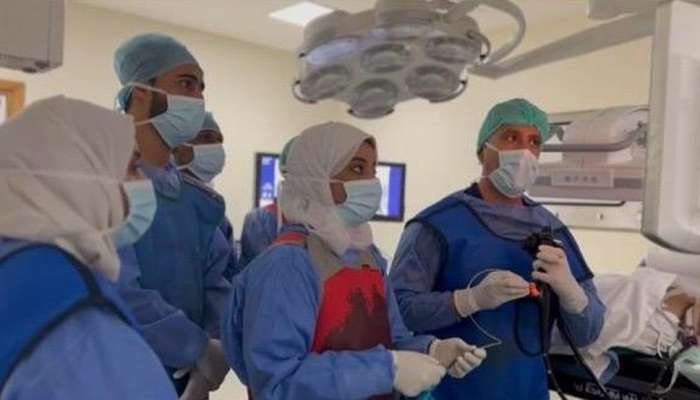The Royal Hospital in Muscat, Oman has made history by successfully performing a minimally invasive procedure on a patient suffering from cholecystitis. This groundbreaking operation involved inserting a metal stent into the gallbladder without the need for external tubes. Dr. Hisham Abdullah Al Dhahab, Senior Consultant of Gastroenterology and Advanced Interventional Endoscopy at the hospital, explained that the procedure required minimal surgical intervention and utilized ultrasound rays to guide the insertion of the stent directly into the gallbladder. The decision to use this cutting-edge technology was made due to the patient’s advanced age and complex health issues, which made traditional surgery too risky.
The patient’s condition, which included cardiac and brain diseases, necessitated a safer and less invasive approach to treatment. Dr. Al Dhahab and his team at the Royal Hospital opted for the minimally invasive technique to reduce the risks associated with conventional surgery. This decision highlights the hospital’s commitment to providing the best possible care for patients, even in challenging cases. By embracing modern technologies and techniques, the hospital is able to offer innovative solutions to complex medical issues, ultimately improving patient outcomes and quality of life.
The successful use of minimally invasive technologies for the treatment of cholecystitis showcases the Royal Hospital’s dedication to staying at the forefront of medical advancements. Dr. Al Dhahab’s expertise in gastroenterology and advanced interventional endoscopy played a crucial role in the success of this groundbreaking procedure. The hospital’s investment in state-of-the-art equipment and training for its medical staff has allowed them to offer cutting-edge treatments that were previously unavailable in Oman. This development is a testament to the hospital’s commitment to providing patients with the highest quality of care possible.
The implementation of minimally invasive procedures in the treatment of cholecystitis represents a significant advancement in medical care in Oman. By utilizing technologies such as metal stents and ultrasound guidance, doctors are able to treat complex conditions with greater precision and minimal risk to patients. This approach is particularly beneficial for elderly patients and those with underlying health issues, who may not be suitable candidates for traditional surgery. The Royal Hospital’s successful adoption of these techniques sets a new standard for medical care in the Sultanate of Oman and positions the hospital as a leader in innovative healthcare solutions.
The innovative approach taken by the Royal Hospital in treating cholecystitis highlights the importance of embracing new technologies in the field of medicine. By continuously striving to improve patient care through the use of cutting-edge techniques, hospitals can offer more effective and personalized treatment options. The success of this minimally invasive procedure not only benefits the individual patient but also sets a precedent for future medical advancements in Oman and beyond. As technology continues to evolve, it is essential for healthcare providers to adapt and incorporate these innovations into their practices to enhance patient outcomes and improve overall quality of care.
In conclusion, the Royal Hospital’s successful use of modern minimally invasive technologies for the treatment of cholecystitis represents a significant milestone in healthcare in Oman. By combining expertise in gastroenterology and advanced interventional endoscopy with state-of-the-art equipment, the hospital was able to provide a safe and effective treatment for a complex case. This achievement underscores the hospital’s commitment to innovation and patient-centered care, setting a new standard for medical excellence in the region. As the field of medicine continues to advance, the Royal Hospital’s success serves as a testament to the importance of embracing new technologies and techniques to improve patient outcomes and enhance the overall quality of healthcare services.











